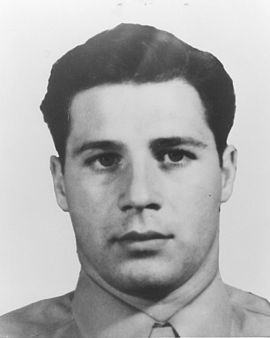Tuesday, January 31st, 2017
Joseph Vittori
Joseph Vittori was born in 1929 in Beverly, Massachusetts. He worked on his father’s farm until he enlisted in the U.S. Marine Corps in 1946, shortly after his eighteenth birthday.
When you read about this Everyday Hero, you will surely be shocked at the number of occasions when he could have avoided danger. But Joseph Vittori kept stepping up, to serve his country, to be with his mates, to protect the members of his unit. This was not a man who shied away from danger. This was not a man who took lightly his commitment to his fellow Marines.
I never cease to be amazed at the bravery and dedication that Everyday Heroes exhibit, especially when their teammates’ lives are in danger.
After enlisting in the Marine Corps, Joseph Vittori was sent to the Marine Corps Recruit Depot Parris Island in South Carolina where he graduated in December 1946. He served briefly at the Norfolk Naval Shipyard in Norfolk, Virginia and Brooklyn Navy Yard in Brooklyn, New York before being attached to the Marine Detachment aboard the USS Portsmouth from April to June 1947. After sea duty, he was then stationed at the Philadelphia Navy Yard until May 1948, when he joined the 2nd Marine Division at Camp Lejeune, North Carolina. From January to May 1949, he served with the Sixth Fleet in the Mediterranean area and again served at Camp Lejeune, until October 3, 1949, when he was discharged.
With his service to the Marine Corps over, Joseph returned to his hometown of Beverly, Massachusetts and worked for a year as a plasterer and bricklayer until enlisting in the Marine Corps Reserve on September 26, 1950 for an indefinite tour of active duty. He was sent back to Camp Lejeune for training until January 1951, when he arrived in Korea to join Company F, Second Battalion, First Marines, First Marine Division (Reinforced). He participated in the South and Central Korean campaign, receiving a promotion to corporal on June 15, 1951. On June 9, 1951, he earned his first Purple Heart when was wounded near Yanggu and, after leaving the field hospital, was assigned a position as a property sergeant. After a week at the new job, he asked to rejoin his buddies in his old infantry platoon.
On September 16, 1951, during the Battle of the Punchbowl his company was assaulting Hill 749, where the Korean People's Army had established several entrenched positions. A vicious enemy counter-attack drove back a forward platoon with heavy casualties, and along with two other volunteers from his reserve platoon, he dashed into hand-to-hand combat in the midst of the swarming enemy to give the Marine company time to consolidate its positions. Later, when a call went up for an automatic rifleman to defend an isolated heavy machine gun position on the flank of his company’s sector, he again volunteered. With heavy casualties leaving a 100-yard gap in the Marine lines at the position, he fought a single-handed battle to prevent an enemy breakthrough. Leaping from one side of the position to the other, he kept up a withering fire of over 1,000 rounds in three hours. He made repeated trips through heavy shellfire to replenish his ammunition, manned a machine gun after its gunner fell and, despite enemy penetration to within feet of his position, kept the enemy out of the breach in his company’s lines until he was killed. The next morning the Marines counted almost 200 enemy dead in the area.
He was killed in action on September 16, 1951, two months after being allowed to return to his unit. He posthumously received the Congressional Medal of Honor on September 7, 1952.
Thanks to Wikipedia for its post about Joseph Vittori.
Here's more text.
Recent Posts
- Humbert Roque Versace
- 58,267 On the Wall
- Joseph Vittori
- Marine Corporal Jonathan Yale and Marine Lance Corporal Jordan Haerter
- Jacklyn Harold “Jack” Lucas
- Henry “Red” Erwin
- Desmond Thomas Doss
- Charles Kettles
- The Signers of the Declaration of Independence
- Those Who Serve
- Bennie Adkins
- Charles Martland
- Those Who Served in Vietnam
- 9/11/12 Revisited
- Those Who Protect & Serve
- Florent Groberg
- The Krissoff Family
- Wojtek the Persian Bear
- On A Train Bound for Paris
- The Pearl Harbor P-40 Boys
- Irena Sendler
- A Soldier Died Today
- Franz Stigler/Charlie Brown
- Danielle Kelly
